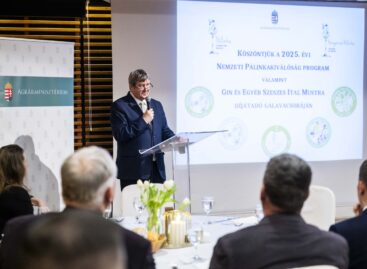Safety, quality and sustainability
On the first day of the Business Days conference Dr Beáta Olga Felkai, deputy state secretary of the Ministry of Agriculture told in her presentation that players in the food chain – from producers through processing companies and retailers to catering businesses – are simultaneously struggling with market, technological and regulatory challenges.
This article is available for reading in Trade magazin 2025/11.

Dr. Beáta Olga Felkai
deputy state secretary
Ministry of Agriculture
Consumer expectations are changing rapidly, while the industry faces modernisation, energy efficiency, sustainability and innovation issues.
Regulatory background, industry tasks
The ministry can support the implementation of agri-food policy in many ways, and the two most significant are intervention on the regulatory side and the planning and provision of support instruments. Several pieces of legislation affecting the functioning of the food chain are currently fine-tuned, with the objective of achieving sustainability and food safety goals within a realistic and enforceable framework. The food industry is facing complex challenges, for instance raw material supply is highly exposed to weather and macro-environmental changes. Energy efficiency will become even more important in the coming period: both environmental expectations and production costs are driving investment in this area. In this context, innovation – whether in products, processes or even packaging – can be a key factor, although the synchronisation of supply and demand is sometimes delayed. We must also calculate with the constant change in consumption habits: this is reflected in the composition of shopping baskets, in the demands related to taste and quality, and in changes in eating habits resulting from social processes – market players need to adapt flexibly to these.
The basis for making decisions
Consumer decisions are most influenced by price, taste and quality/health impact. However, retailers have a strong responsibility in what consumers choose: what they list, where they place it, how they price it and what private label alternatives they create. The vast majority of consumers think sustainability is important, but they associate different things with it. Most shoppers would like to see a higher proportion of Hungarian products on the shelves of large chains, while acknowledging that there are categories (e.g. coffee, cocoa) where this is objectively impossible. Dietary changes are increasing the demand for plant proteins and the production of high-quality meat from responsible animal husbandry. On the supply side climate and water management risks are shaping crop patterns and driving product development. Meat consumption isn’t disappearing, but the development of alternatives and their improved gastronomic usability are key.
Related news
EU Commissioner: new regulation strengthens protection for farmers and smaller suppliers in the food chain
🎧 Hallgasd a cikket: Lejátszás Szünet Folytatás Leállítás Nyelv: Auto…
Read more >The National Pálinka Excellence Program 2025 awards were presented
🎧 Hallgasd a cikket: Lejátszás Szünet Folytatás Leállítás Nyelv: Auto…
Read more >Related news
40 secure jobs, sustainable solutions – new BURGER KING® in Csepel
🎧 Hallgasd a cikket: Lejátszás Szünet Folytatás Leállítás Nyelv: Auto…
Read more >








